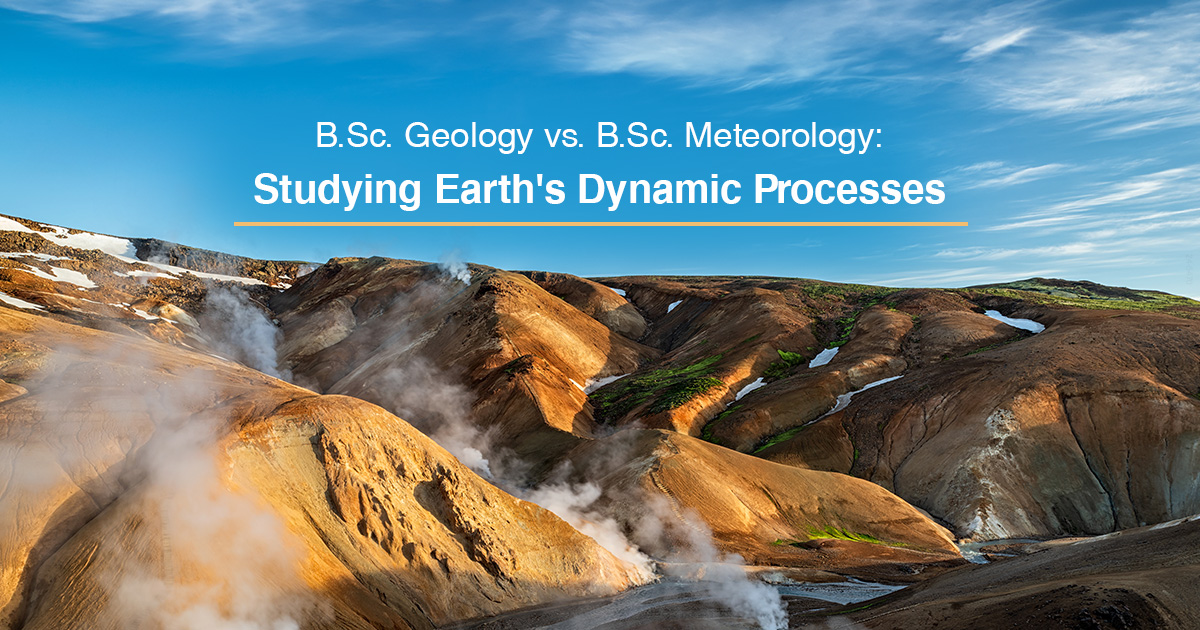Blog Detail


B.Sc. Geology vs. B.Sc. Meteorology: Studying Earth’s Dynamic Processes
30-09-2024

A B.Sc in Geology and a B.Sc in Meteorology are fascinating career options that explore various aspects of the earth’s dynamic processes. Both fields offer fulfilling opportunities to contribute to scientific understanding and address real-world challenges related to our planet's dynamic processes. A geology degree focuses on studying Earth's physical aspects and the forces acting upon it. As a geologist, you examine rocks, minerals and landforms and study the Earth’s layers and phenomena like volcanoes and earthquakes. On the other hand, a degree in meteorology is about analysing atmospheric phenomena and processes, such as weather changes and climate trends.
On the face of it, both fields focus on studying the Earth’s dynamic processes. Still, geology is more about the geological process and formation of rocks, and meteorology is more about the Earth’s atmosphere and weather conditions.
Course duration
A Bachelor of Science in Geology takes three years to complete. It is a semester-type examination where the student has to pass physics, chemistry and mathematics in 10+2 to be eligible. A bachelor's in meteorology is also a three-year-long course divided into semesters and spans from year to year, delving deeper into studying the atmosphere.
Curriculum
The curriculum of a B.Sc. geology programme is designed to provide students with a comprehensive understanding of the Earth's structure, composition, and processes. Students may study foundational science subjects such as mathematics, physics, and chemistry in the initial years. As they progress, the focus shifts towards specialised geology courses, including:
- Geochemistry
- Palaeontology
- Structural geology
- Sedimentology
- Mapping techniques
- Mineralogy
- Geophysics
The curriculum of B.Sc. Meteorology revolves around atmospheric science, climatology, and weather forecasting. Students study the physics and dynamics of the atmosphere, meteorological instruments, and data analysis techniques. Mathematics and physics are foundational components, and computer programming is often emphasised for numerical weather prediction. A few key subjects that are covered in the programme include:
- Climatology
- Atmospheric Physics
- Atmospheric Chemistry
- Weather analysis and forecasting
- Atmospheric science
Career opportunities
Geologists have an ocean full of opportunities; they can work on carbon capture and storage, geothermal energy, mining and mineral resources, climate change, the history of life on Earth, and energy production. Some of the lucrative career options for a geology graduate are in the fields of:
- Geotechnical engineering- contribute to engineering projects by utilising factors such as soil stability for usage in construction and plantation sites
- Research and development- along with a master’s degree in geology, you can expect to conduct research on geological processes, geological history, and lead roles in academia, among other things
- Risk assessment and mitigation- events such as landslides, earthquakes and volcanoes can be hazardous, and a geologist can contribute to hazard assessment and risk mitigation by formulating effective strategies
- Mining geology- focus on the extraction of minerals and resource management
- Natural resource exploration- as a geologist, you will play an essential role in exploring and evaluating mineral deposits, gas, oil and other natural resources, getting a chance to work with several energy and mineral companies
Similarly, a meteorologist can work in diverse industries, such as government, consulting firms, television meteorology, aviation companies, etc. Predicting the weather, researching the climate, and environmental consulting are just some of the job duties of a meteorologist. Some other career options to ponder upon include:
- Armed services- the Air Force and the Navy require meteorologists; they not only offer a fair package but also hire in numbers
- Media- often, we encounter meteorologists working for the television or the radio. This profile is worth considering for anyone interested in mass media, along with a bachelor's in meteorology.
- Marine and oceanography- to know more about the weather patterns, climate systems and ocean currents, meteorologists can work alongside oceanographers and study these areas in depth to understand the interaction between the ocean and the atmosphere
- Climate research- you can also become a part of policy development in governmental organisations or research institutes, as several long-term opportunities exist in these areas relating to climate trends, patterns and modelling
- Renewable energy- optimising energy to improve the efficiency of solar or wind power systems can be made possible with the help of meteorologists analysing weather patterns and trends
Ultimately, the choice between choosing a B.Sc. in Geology and a B.Sc. in Meteorology is a decision that is based on where your passion and interests lie, whether you are more inclined towards working and understanding the Earth’s solid materials or find yourself drawn more towards studying atmospheric phenomena like climatic conditions or weather patterns. As stated above, both these fields offer rewarding career paths and are emerging interdisciplinary courses that explore various aspects and realms of the planet.